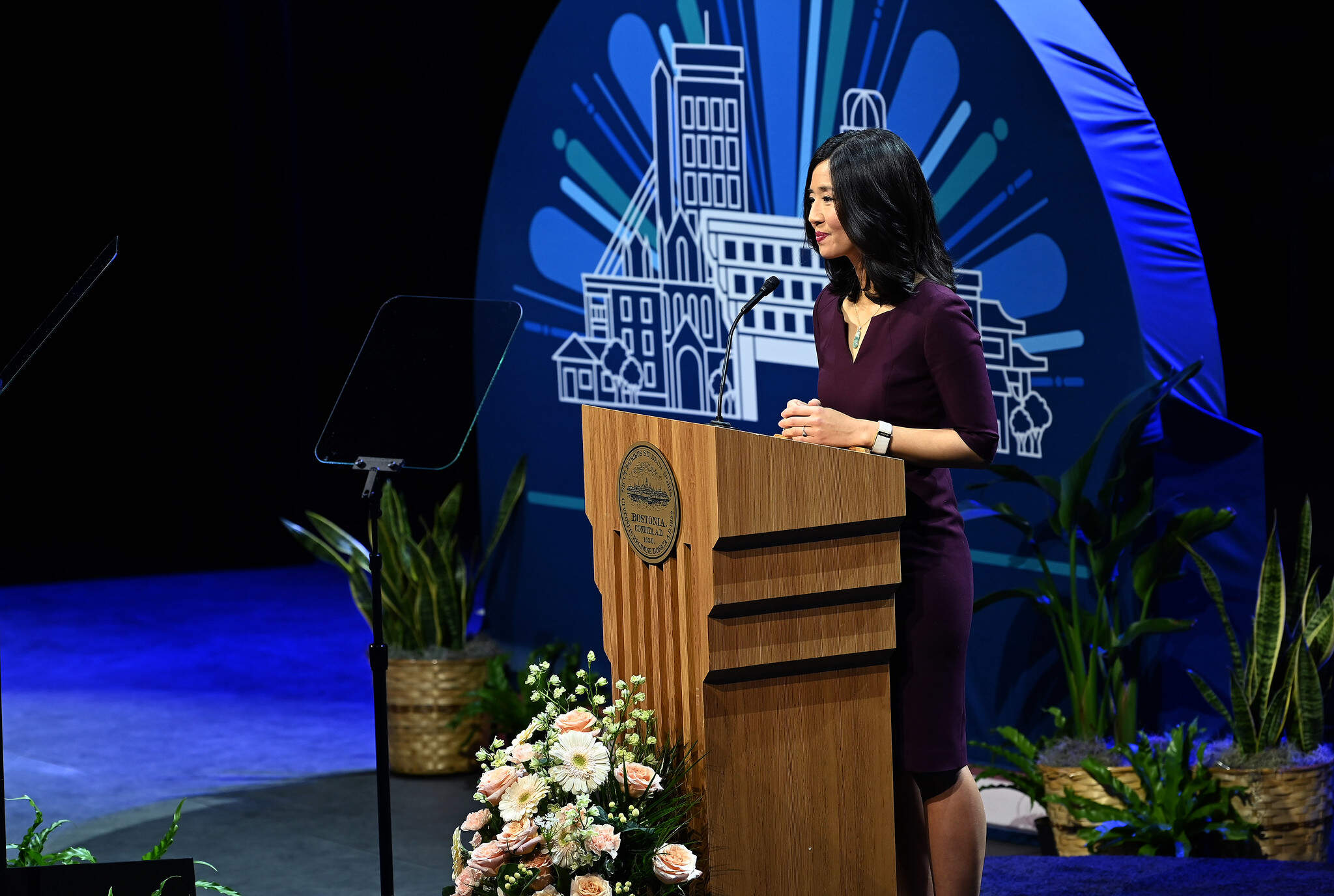Advertisement
'BPS Sundays' free museum program launches with a bang — but leaves some out

By the numbers, Boston Mayor Michelle Wu’s recent move to allow Boston Public Schools families to attend six of the city’s major museums free of charge on certain days has been a rousing success.
On Feb. 4 and Feb. 11, six institutions — including the New England Aquarium, the Museum of Science and the Franklin Park Zoo — welcomed nearly 1,900 Boston students and their guests.
Under the initiative, every BPS student and up to three guests can attend those institutions for free on the first two Sundays of every month until August. Though they’re encouraged to make reservations in advance, all they need to bring is their student ID.
But amid the excitement around what the city has dubbed “BPS Sundays,” some city families hope the program still has room to grow.
For now, only the roughly 46,000 BPS students and their guests are eligible to participate, leaving out tens of thousands of city youth who attend school outside the district.
“The minute I heard about [the program], I was like, ‘Let me hurry up and call the mayor’s office, and see what we can do about this,” said Milly Arbaje-Thomas, the president and CEO of METCO, the decades-old program in which thousands of Boston youth can opt to attend suburban schools.
Arbaje-Thomas said the over 3,000 students enrolled in METCO are predominantly low-income students of color — just like those this program was designed to serve. If anything, she argued, because they spend so much time in one of 33 suburban communities, METCO students are even less able to access all that Boston has to offer.
“Many times, they lose that sense of identity and that sense of belonging in their own community,” she said. “We just look forward to being able to benefit from all the things that our city is doing on behalf of its residents — since we’re a part of this community.”
BPS parents tout pilot
For BPS parents like Phillip Smith who’ve already taken part in BPS Sundays, the program feels “amazing.”
Smith brought his two sons, ages 5 and 6, to the New England Aquarium on the program’s first Sunday. After showing their BPS student IDs, the kids and their parent were seamlessly ushered into the building — saving $84 in admission costs.
The children’s first visit was a great success, Smith said in an interview. “My boys are water boys,” he said. ”They love to see the different types of fish, sea creatures — we even got to see the sea lion show.”
Smith, who teaches eighth grade at the Dearborn STEM Academy in Roxbury, also coaches Pop Warner football. He says he’s started nudging his students — and players — to take advantage of the new opportunity.
District data show that attendance jumped at all six participating institutions, including the Museum of Fine Arts, Boston Children’s Museum and the Institute for Contemporary Art, where admission is already free for all visitors 18 and under.
Advertisement
Over the first two Sundays in February, staff at the Boston Children’s Museum said they admitted 331 BPS students and guests — and with very few hiccups.
Carole Charnow, the museum’s president and CEO, thanked Wu for her vision in a statement, adding that “we hope this program will give Boston Public School children and their families a feeling of ownership, and one of belonging, to Boston’s many cultural riches.”
It’s already having that effect. The Boston Children’s Museum, where a single non-member ticket costs $22, said 43% of those who visited the institution for free in early February had never been before.
In last month’s State of the City address, Wu unveiled BPS Sundays by reflecting on her own childhood experience of going to an art museum with her mother on a day when admission was free.
In that moment, Wu recalled, “this mom with no money and no words in this language feels like the best mom on earth, because she has given her daughter the world for a day.”
Wu thanked the participating institutions for “making Boston a true home for young people and families.” Across all six, the ordinary cost of admission can climb as high as $120 for a family of four.

A citywide expansion?
In its pilot phase from February through August, BPS Sundays will cost $1 million, to be drawn from a blend of philanthropic support and $300,000 from the federal COVID relief funds awarded to Boston in 2021.
But like Arbaje-Thomas, some leaders at the city’s 20 charter schools — which serve about 13,000 students, many of whom are low-income — hope to see it become a broader benefit.
Earlier this month, Nicole Mack — head of the art-and-music-focused Conservatory Lab Charter School — told CommonWealth Beacon that she had to inform families excited about BPS Sundays that they couldn’t take part.
The state’s Republican Party, which has historically supported charter schools, has made political hay of the policy’s narrow design.
In a statement earlier this week, MassGOP chairwoman Amy Carnevale charged that the exclusion of the city’s charter students “seem[ed] politically motivated,” and proffered it as “another example of Mayor Wu not putting the interests of children over that of a political agenda.”
Though operated by nonprofits, those charter schools are publicly funded based on their enrollment — and they rely on BPS for other needs, including transportation. Through a spokesperson for the sector, several charter school leaders declined to comment further.
Meanwhile, city officials stressed that BPS Sundays is a pilot program and that its early popularity may signal the way to expansion.
“We’ve started with our BPS students and families so that we can best understand how to engage community members and improve this program,” a city spokesperson said.
“As we measure and learn, we hope to add more partners and resources to be able to expand the program even further."
